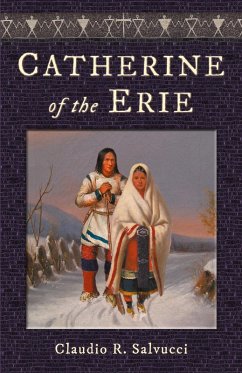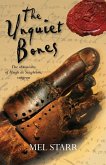Before Saint Kateri, there was Catherine Gandeaktena. A daughter of the shadowy Cat Nation, a confederacy of tribes living on the southern shores of Lake Erie in the mid-17th century, Gandeaktena was a child of the longhouse. Brought up in the wilderness haunts straddling present-day western Pennsylvania and eastern Ohio, Gandeaktena came of age as one of the final generation of Eries before the utter annihilation of their nation. Situated hard by the border of the fearsome Iroquois confederacy, the Eries existed in a state of perpetual danger from their traditional enemies, whose far-ranging war parties ever sought new victims for their expertly wielded muskets. Though sheltered in early life under the protection of a kindly mother and strong father, Gandeaktena's naturally peaceable and humble nature was forced to endure the blood and fire which were not uncommon features of life among the nations. Bold raids by Cat Nation braves brought a steady stream of enemy captives to the Erie town of Rigué-captives whose courage must be put to the test via ritual torture and death on the scaffold. In Gandeaktena's teen years, the endless cycle of raiding, torture, and death in the eastern woodlands would be consummated in a riot of slaughter and smoke. Even as the life of the Cat Nation was snuffed out by the cruel war whoops of the triumphant Iroquois, Gandeakena's path was just beginning. Brought as a slave to live among the Iroquois, Gandeaktena would find a kindly husband, Francis Xavier Tonsahoten, and a loving God. The Erie Gandeaktena would become the Christian Catherine-the Mother of the Poor-and thus transformed would plant seeds in the mission town of Caughnawaga from which would eventually sprout a bountiful harvest, including the Lily of the Mohawks herself. Deeply imbued with the spirit and language of this obscure period of history, Catherine of the Erie is a historical novel which transports the reader from the harrowing forests of the eastern woodlands to the spiritually rich heyday of New France where medicine men and manitous were giving way in the hearts of the native people to the gentle yoke of "He Who Has Made All" and his Son, Jesus Christ. From these hearty, long-suffering people would emerge a unique expression of Christian devotion which inspires cradle Catholics and converts alike to this day.
Hinweis: Dieser Artikel kann nur an eine deutsche Lieferadresse ausgeliefert werden.
Hinweis: Dieser Artikel kann nur an eine deutsche Lieferadresse ausgeliefert werden.








